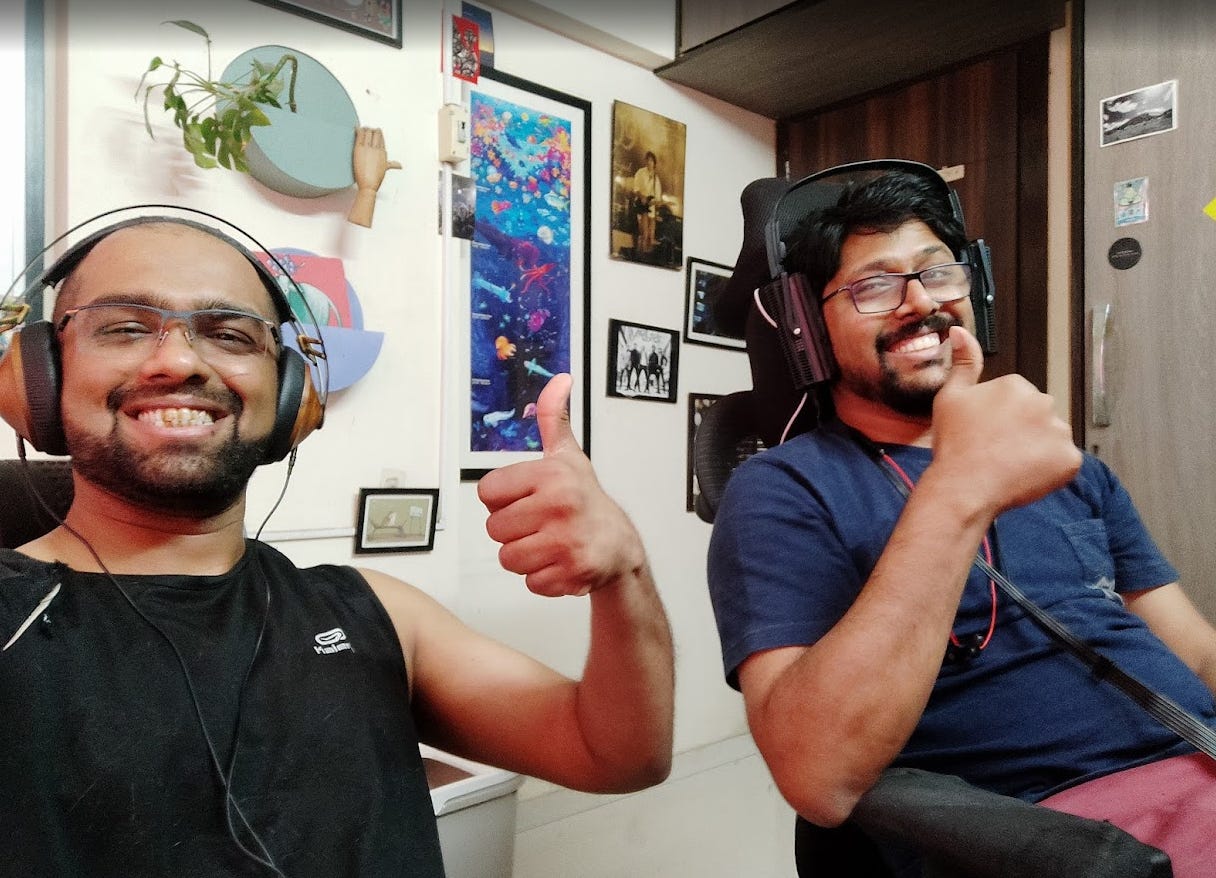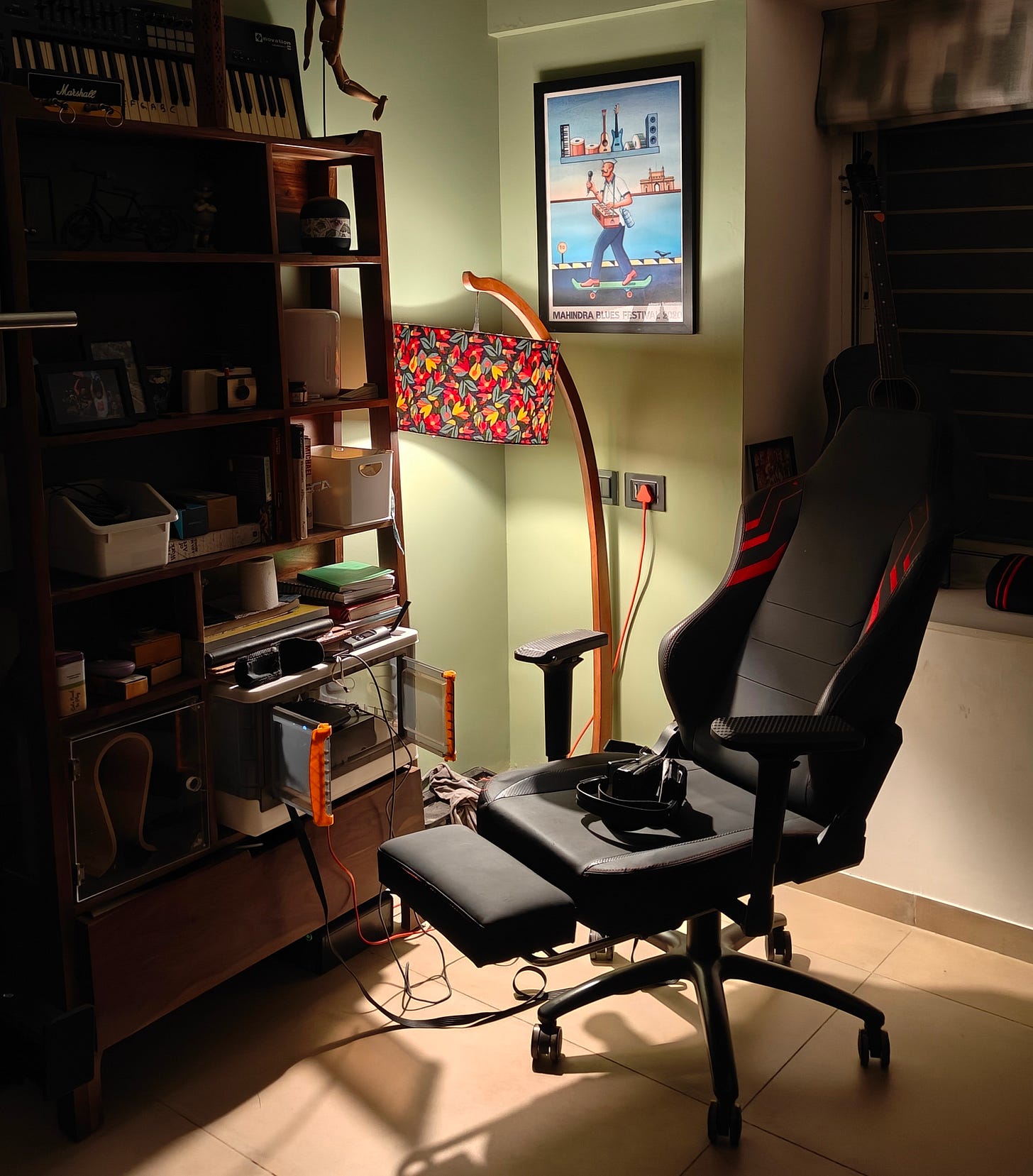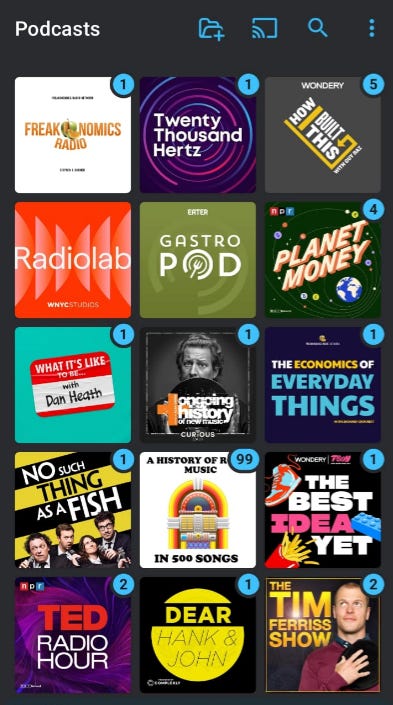Finding my internal algorithm
And reclaiming a word that's got a bad rap in the social media era
Two things happened to me in 2022 that changed the way I listen to music.
First, I wondered why I liked some bands and not others that you were supposed to if you were fans of a genre. For example, I enjoyed Metallica, but ambivalent to Megadeth. I loved Opeth but scant few others employing growl vocals.
Secondly, I wondered why my wife Divya and good friend Srikeit - who I subject to many musical experiments - reacted the way they did to certain songs. Both were fairly accepting of hard rock, I wondered why some death metal clicked for them, and some pop didn’t. And of course why they both were unable to see the beauty of some songs I loved.

It shouldn’t have been such a revelation, I guess I was just deep in my own musical bubble, but both of those starting thoughts made me realise that everyone looks for different things in music. Over the past three years, I’ve been obsessed with finding what that is for me, something I call my musical genome.
Partially, my reasons1 are:
Having a strong sense of melody
Having a ‘transportative’ quality
The song giving you something new to discover on every listen
These reasons (and many others) manifest themselves in some common characteristics across my favourite songs - great melodic guitar solos, meaningful light-to-heavy transitions, long songs that give space for sonic worldbuilding, melancholy psychedelia…
It helped me place together why I have favourite songs ranging from Pink Floyd’s Dogs to Bappi Lahiri’s Inteha Ho Gayi, from the Opeth’s brutal Ghost of Perdition to Apparat’s delicate Goodbye2. At the same time, it made me realise why I wasn’t drawn to certain artists - I was never big on lyrics (explained why I didn’t feel anything for Bob Dylan), neither was I listening to aggression for aggression’s sake (like a lot of death metal or djent).

As I got more serious about this exercise, I let go of trying to keep up with current releases and focused more on studying why I like the music I do.
One way to do this was by studying musical exceptions - songs I loathe by arists I adore (Yellow Submarine by The Beatles) or songs I adore by artists I’m otherwise ambivalent to (Desolation Row by Bob Dylan) or genres I’m not particularly keen on (I love The Message by Grandmaster Flash, despite not being a hip-hop fan).
Another thing I’d do was look at songs by bands I like, which are not normally in popular best-of lists. Van Halen’s Humans Being, Iron Maiden’s Como Estais Amigos, Oasis’ Gas Panic!, Porcupine Tree’s The Sky Moves Sideways Phase 2, and India’s own legends Zero’s Cry - all would feature among my favourites but would not in an official best-of list.
I also went back to songs I loved growing up to further ‘provide data’ - so I spent time bingeing on a lot of 90s Bollywood, turn-of-century mainstream pop, and of course, the golden era of Indipop-Pakpop. While this helped me rediscover a lot of those songs (this time on good gear!), it was more useful in refining that musical genome I spoke about - the reasons I like the songs I do.
It’s been ~3 years since I first had the thoughts I mentioned at the top of this essay. My relationship with music has been completely transformed. I am enjoying music much more, and feel I know myself better. And, as an interesting outcome, I think I’m able to help Divya and Srikeit find more music they may like by extrapolating their reasons.
Sometime in 2023, I had another thought. I was increasingly starting to see music like another passion of mine - trekking. Both had effort and payoff. In music that might be a simple buildup and a satisfying chorus; and for a trek that would be the ascend and the view, respectively.
Look at it this way. A well-made pop song is like an easy trek. Not very difficult on the way up, and a pretty good payoff. Something like, say, Tikona - probably the highest ROI trek in the Sahyadris.

On the other hand, a progressive metal epic by Opeth or Between The Buried & Me was more like a Harishchandragadh - logistically more complicated to get to, tougher to climb, but possibly the greatest view the Western Ghats have to offer - the Konkan Kada cliff.

For many people, the former experience is enough, because its ascend is the maximum effort they’re willing to suffer. Sure, they may get a better view from a tougher trek, but that’s when a personal cost-benefit analysis enters the equation. So in that sense there is no theoretical ‘best trek’ - it’s really contingent on the effort one is willing to take.
Others may not be satisfied with an easy trek and want more. Maybe they like the exercise, maybe the payoff feels sweeter with the added effort, maybe the ascend becomes therapeutic for them, maybe the social validation coming from doing something tough, whatever the case may be.
Looking at it through this lens, I thought the same may apply to my other interest. True fans of music will start craving more - they may move from the accessible simplicity of Backstreet Boys or Sabrina Carpenter (depending on your generation!), graduate to the relative complexity of Bon Jovi, and those who seek even more may move on to Tool or classical music. I’m not saying Tool > Backstreet Boys, though I am sure many will be happy to make that argument, but about the payoff one seeks from their preferred level of ‘graduation’. Just because Dream Theater may make ‘theoretically better’ music because of its virtuosic playing and payoffs, doesn’t mean Srikeit should necessarily like their stuff, because, well, let’s face it, there’s a lot of wankery to sit through which he may not enjoy. So while the build-up to the outro in BTBAM’s White Walls is certainly worth it for me (and gives me the musical equivalent of Konkan Kada), that may not be the case for someone who doesn’t care for 10 minutes of growls and chaos. Effort vs payoff.
The “different people like different music” concept thrown about by musical liberals started making more sense to me now. And I realised this could extend to pretty much anything else - books, TV shows, food.
In fact, around this same time, Divya finally managed to convince me to watch some of her favourite TV shows. She would be watching them a second time (in one case, third!). She didn’t seem to mind at all, in fact she would often find connections, hidden details and more that would bring her added delight, different from her first watch.
And I thought - woah, that’s exactly what I feel about my favourite songs. Re-listenability. There’s something new to uncover each time.
“Pay attention to what you pay attention to” - Amy Krause Rosenthal
The two years from mid-2023 to the time of writing this saw a period of massive personal and professional flux for me.
We shifted cities and bought a home. We turned our ‘two freelancers’ setup into an incorporated LLP. Utsav and I started The 6% Club which is now in its 6th cohort, and went from weekend experiment to also an incorporated LLP. I joined and left a university teaching gig after realising I put too much on my plate. I got fitter. I ended Simblified, a podcast which I used to run with Srikeit and two other close friends - after 9 years and 300+ episodes.
I was happy, confused, scared, joyous all at once. I felt sorted one day, in pieces the next. In the space of mere hours I’d go from “this is a dream life” to “how the fuck did I end up in this hellhole situtation?”.
All this meant having deeper conversations with my therapist3. One thing he told me really stuck with me: Your emotions are just trying to tell you something. An event that happened may make you sad - but the emotion is only a vessel, what’s that emotion actually trying to say?
A few years ago I’d have dismissed that line as something a stoned friend would have said after one drag too many, but at that moment - after all my head had been through - it really made sense. It flipped a switch - it gave me the permission to ‘step out of my body’ and neutrally observe what was happening. I used to do this every time I was overcome with some emotion or the other. When I got angry, I was able to pinpoint ‘the message’ - and very often stopped myself from doing / saying stupid things and addressing the problem at a root level. I got good enough to the point that even during meltdowns (which I have frequently), I am able to have a parallel conversation in my head as a ‘commentator’ of what’s happening. Doing this provides me valuable ‘data’ to make sure the cause of the meltdown doesn’t happen again… or at the very least, can be addressed in some way.
I call this whole process finding my internal algorithm. Finding the knobs, processes, variables and how I react to various stumuli.
Doing this has helped me through some tough situations, ensure work doesn’t suffer even if I have a breakdown, trace back said breakdown to origin points, see others differently, and just be kinder to myself. I am not sure if I am overall happier than I was two years ago, but at least I can say I know myself better.
It’s helped me discover nuance. When I started freelancing in 2019, my idea was to have as much free time as possible. Now, having gone through periods of a lot of restless free time, I realise things are more nuanced than that. Why, just this week I realised I have a very limited social battery, even with close friends - now I am thinking of how to work with that rather than fight it - as if being asocial is something to be modified.
All this happened in parallel to me trying to find my musical genome - or, finding my internal musical algorithm. It’s been fascinating doing this at the same time, with both processes helping each other.
Along the way, I came across that Amy Rosenthal quote on a Dear Hank & John podcast and it’s become one of the most influential aphorisms in my life.
It’s an exciting time for me now. The flux I mentioned above continues and in some sense has only got more flux-y. But one shift is that I’m treating life as a giant laboratory to help me find my internal algorithm. Every experience - good, bad, personal, professional - helps sharpen, reflect and take action. I try not to control too much and if emotions happen, I let them do their thing and reflect on it later. And as I expected, the algo gets its biggest updates most during moments of massive stress, like how a huge financial crisis leads to the reforms that were long overdue.
A good example of how this has helped me already is the change in my media diet.
I’ve stopped paying attention to politics4 or daily tech updates. I ruthlessly unsubscribe to publications / podcasts / newsletters I’ve fallen out of love with, or don’t add value anymore. Instead, what I’ve done more of is do deep-dives and go down rabbitholes. If I was fascinated by an essay, I would take Rosenthal’s advice, sought more of what I paid attention to, and read the sources, or more of the same topic. This approach - along with quality subscriptions like WIRED and Nautilus, have led me to some wonderful books, videos and even songs. I don’t miss things I’ve axed from my media diet - such as the Bugle and Pivot podcasts.

Another example of how this ‘internal algo’ approach has helped is reducing FOMO - especially for music events. I’m getting increasingly comfortable letting go of my erstwhile (and largely self-given) identity of a rock event attendee. I chose to skip Guns ‘n’ Roses and Steven Wilson - something I’d have never thought I’d do just two years ago. In fact, thinking about what gig I’d actually go for is a fascinating algo-improving exercise (for the record, if I could attend just one more concert in my life, it would be Iron Maiden).
I’ve seen many more benefits. I don’t overthink weekend plans, nor do I get too upset if they don’t go according to plan. I’m comfortable not “being productive” all the time - I am now happy going on long cycle rides without maximising it by listening to podcasts all the while. I ping5 friends spontaneously after seeing an update on LinkedIn rather than ‘plan to speak’. I am more decisive deciding about what I choose to give my time to - recently, I put down the highly-recommended Neal Stephenson tome Cryptonomicon after the first 10% bored the bejeezus out of me. And I didn’t need to feel bad about it or even think it was a bad book, I’m just wired different to the people that do vibe with it.
More than anything, this way of living and thinking opens up some exciting possibilities - that some art that may strongly resonate, or some awesome new business opportunity - may come from the most random of places.
All of this coincided with a general appreciation of mindfulness - the logical endpoint of all millennial midlife crisis longform reflective writing; and an occupational hazard being close friends with Utsav.
I’m still far from being done and it would be naive to say I’ve cracked my algo, but the process itself is very illuminating.
I think it may be useful to work towards figuring your internal algorithm6 . It may help you get deeper into your hobby, or find something to get enthusiastic about. If you’re doomscrolling, ask why. If you find yourself really engaged with a show, ask what about it caught your attention. If you feel your heart rate increase after a certain kind of office email, ask why. I can’t guarantee the outcome will necessarily be a happier you, but you may discover yourself and that’s not a bad thing.
One outcome that’s happened for me is thinking about the larger things - the personal end goal which then dictates what you may do today. I suppose that makes sense - all algorithms have a driving force. I reckon everyone’s end goal will be some variant of happiness and contentment. Thinking about an internal algorithm may help you uncover what your idea of happiness is. And even if not that, you may get an achievable, in-between goal, such as writing a book or even something relatively frivolous like if you like the idea of pineapple on pizza7. For example, a reasonably achievable in-between goal for me is to get to a point where I can devote 2 days a week for non-commercial, active creative pursuits.
If nothing else, thinking in this way gives you a whole bunch of actionables and ‘thinkables’ - so it’s not an exercise in pure philosophy.
The word ‘algorithm’ has got a bad rap in the last few years after association with the more addictive parts of the internet. And that’s a pity. When I first came across the term in a coding class in high school, I was enamoured by it. It felt like everything - from sports tactics to music to business to history to life - could be boiled down to these simple yes-no-if-if-not boxes. The cold hard mathematics that balances the beautiful randomness of the universe.
If you want to be a little more profound about it, you could say that finding your Internal Algorithm is the ideal counter to the age we live in - IA vs AI.
Anyway, I’m off to give my favourite songs a re-listen and hopefully discover something new within them, and update my musical genome.
Thank you for reading what was one of the most personal posts I’ve ever written.
Someday, I’ll write a full post about this - there are around 10 ‘reasons’ in all.
I am fairly confident this is the first time those four songs have shared the same paragraph.
Side note - go to therapy. Especially if you feel you don’t need to. Especially if you’re male. Especially if you’re male and feel you don’t need to.
This specifically is an interesting shift. Some of you may know that I used to author a political newsletter a few years ago. I felt the ‘need to be an informed citizen’. While I still take efforts to do that, I don’t keep up on a daily basis and throw myself into the depressing news cycle and media mechanics meant to maximise engagment. Instead, I donate / subscribe to the publications whose values align with mine and wish them all the best.
I still message / email them, not cold call them on the phone. I’m not a psycho.
I’m conscious of saying “work towards figuring” rather than “figuring”. I don’t think you can truly ever figure your true algo out, and I certainly have not given this enough research or thought to say I definitively have a way of getting there.
I realise for some, this may not be a frivolous pursuit and to them I apologise.


So this is what I was saving my first substack comment for...
Insightful, beautiful and emotional. And an absolutely relevant in a time where a growing number options of how to live often becomes a endless list of checkboxes to tick for social / personal capital. Godspeed to all of us in our journey of rejecting the most popular presets to find the best settings for our internal algorithm.
Meanwhile, I'm just waiting for the next listening session you subject me to. ❤️
This was a real deep dive and a personal post. So proud of your internal journey, and being brave for taking us all along. Have seen things grow and emerge and can't believe its just been i guess 4-5 years? IA is a lovely thought and I wonder what my IA is too, and this inspires me again to take on that journey. May your iron maiden plans be fulfilled. Peace and light.